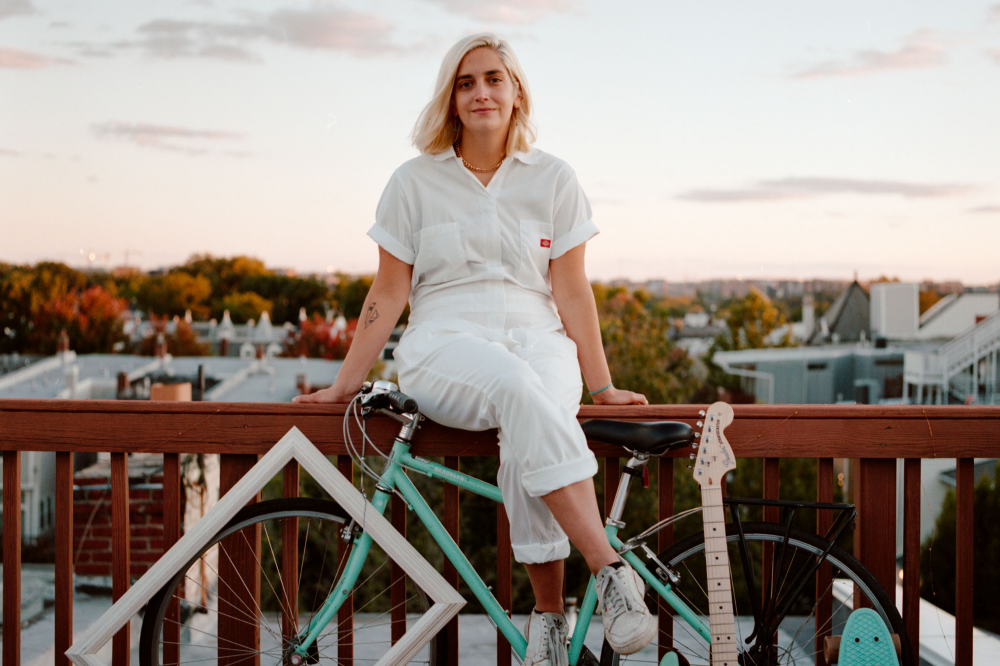Music
 Alli Vega. Photo by Kimchi Photography.
Alli Vega. Photo by Kimchi Photography.
Year of the Scorpio: Inside Alli Vega’s Room, Year + Process
March 12, 2021 @ 10:00am
Alli Vega’s Zoom window depicts that of an artist: a floating head belonging to a woman with shoulder-length blonde hair, surrounded by “quarantine plants.” A lone pot faces a window, absorbing direct rays, while others sit neatly on a hovering wooden shelf just above her bed in the background. Next to the succulents on the right side of the room hangs a number 34 Boston Celtics jersey, celebrating the now-retired basketball Hall of Famer Paul Pierce. She’s from the Boston suburbs. This spot on the wall is reserved for whichever team is in season, from the Bruins to the Patriots to the Celtics.
“It’s so funny because I was looking around right before I signed on and thought, ‘Ah, that Celtics jersey is kind of prominent. Eh, it’s fine.’ The irony of it is, I’m way more of a Pats fan. But I grew up in Boston, so I’m a blanket Boston sports fan.”
Vega goes on to describe Boston sports fans’ bittersweet relationship with former Patriots quarterback Tom Brady, a man who is by all accounts the greatest football player ever but once displayed a MAGA hat in his locker.
“All my Patriot-hating friends are like, ‘You know he’s a Trump supporter,’” Vega says, noting she does not share his political leanings. “I think a lot of Boston turns a blind eye to the fact that he’s said a bunch of pro-Trump things.”
Her room is more than a shrine to her favorite sports stars, past and present, and more than a nursery for her newfound leafy green friends. The space in Northwest D.C. is the video game sanctuary where she’s logged an innumerable amount of hours playing Pokémon and Zelda, and a recording studio where Vega finetunes all the musical elements of her life.
She’s likely best known for her role in the D.C. band Lavender, for which she plays bass and guitar, writes music, and assists with lyrics. However, starting in late 2018, Vega embarked on a two-year journey inward via her solo project Scorpio. In March 2019, she released the EP “Afterthought.” The Facebook party held in its honor dubbed the record “bedroom and surf pop played with the sensibility of an Adidas lesbian.”
“One of my exes actually came up with the Adidas lesbian thing because I’m not butch but I’m not a femme, and usually the in-between of that is this charming term of endearment called a futch,” Vega says. “I was like, ‘I wish there was another word. Like, all I do is wear Adidas.”
Aside from her Adidas collection, Vega says the description is outdated, a relic of an EP she once tried to bury on the Internet.
“I don’t feel like I play surf rock anymore. Genres, for me, are painful and like pulling teeth. I play guitar. It sounds kind of indie-rockish. I use a synthesizer sometimes. Listen, someone else can classify my music for me. I can tell you it’s in the rock sphere, but I can’t tell you what.”
The sound is as she describes: indie rock with DIY origins all recorded at her desk, the same place where she thumbs through books on music theory, lyric writing and other titles poached from Berklee College of Music syllabi. As her sensibilities evolved following “Afterthought,” one goal she’s embraced since the onset of the global pandemic is unsheathing her voice.
“I was trying to hide my voice a lot [on ‘Afterthought’]. I was adding this radio effect [with] a ton of reverb and delay, and I was trying to completely wash out my voice because I struggle a lot with hearing my own voice in recordings. I still do and probably will until the end of time.”
Vega is a tenor. Her mom claims she “stole it,” mimicking an exchange between Bradley Cooper and Sam Elliott’s characters in Hollywood’s latest lazy rehash of the familiar “A Star is Born” story.
“I’m aware that I have an interesting voice,” she says with a natural assuredness. “When I was submitting to different blogs, someone was like, ‘Nice male vocals.’ I was like, ‘Oh.’ I’ve learned to accept it. I’ve learned to appreciate it. A lot of what I learned performing live and writing music [solo] is about confidence. Even if you don’t necessarily have that confidence, just outwardly project the image of confidence.”
On her latest single “I Was Waiting for You to Call,” which is accompanied by a sweet video that deftly melds homages to John Hughes flicks and the tonal lighting of HBO’s “Euphoria,” Vega’s voice is unfettered from the technological weights she applied two years ago. The song is honest, too, recounting a fading honeymoon period of a lost long-distance relationship. Despite its realistic observations of a rocky romance, the song’s sound is weightless and hopeful – a dichotomy and perfect encapsulation of her 2020.
“I lost my biggest hobby, my job fell out from underneath me, my grandfather died, I got broken up with – it was just over and over again,” she says. “It was a very dark place for me for a bit. The connective tie for all [my upcoming music] is finding ways to deal with depression and loss of normalcy, and how to pick yourself up and keep going and start again. A lot of that revolves around the breakup I had. It’s very hard to get over a breakup when you’re sitting in your house all day, which has been great,” she says sarcastically.
In theory, an amount of time unbound by traditional workdays is ideal, but Vega’s experience didn’t line up with those expectations. Rather, she found it challenging to put pen to paper in terms of creative expression and instead sought solace in technique.
“On a personal level, it’s been rough,” she says matter-of-factly. “On an artistic level, it’s been hard because there’s a lot of pressure. Everyone’s like, ‘Write music. Work on your art. Hone your craft. You have all this time now.’ Yeah, I do. I just don’t feel inclined to do it because I’m not living new life experiences.”
Remember those book lists stolen from poor college professors, not to be named?
“I’ve been using this last year to improve technical aspects. I’ve learned to use Ableton [Live] and how synths work more in-depth. I’m working on music and guitar theory – technical things that will help me in the future. They don’t require me to be my most creative self. When I try to approach a creative space, a lot of the time it’s hard because I’m coming to a blank. We have about 4 billion songs about my dog, Bowie. I adopted her in June. She’s very cute.”
Vega contrasts her current method to the rushed-to-completion “Afterthought,” a product of a “pressure makes diamond” approach mastered in her collaborative sessions with Lavender bandmates. Now, she embraces time, referencing a particular song she’s constantly tinkering with.
“Music comes so naturally to me,” Vega says of her creative process. “I can hear a finished song in my head when I have an idea. When I’m playing a song on guitar or synth, I can hear it all in my head. Lyrics are so much more difficult for me. It’s so hard for me because of imposter syndrome and because I have much less practice. I get so frustrated with myself. I’ve been sitting on a song that I really, really like for six months. I have a chorus, but I can’t come up with verses.”
Because of this George R.R. Martin-esque (okay, perhaps not that bad) writing pace, Vega’s plan for the remainder of 2021 is a steady trickle of singles with a thematic connection to “I Was Waiting for You to Call.”
“I want to take my time individually with each song and release them when I’m ready. I’m probably going to release my next song in April. And then, hopefully, [more] every six weeks from then on out, with hopes for an EP in late 2021 or early 2022.”
In the meantime, with vaccinations more readily available and societal antibodies providing a hypothetical foundation for a semblance of eventual normalcy, Vega, like most musicians, is looking forward to a safe return to live settings.
“It’s been hard,” she says. “I’m in a fortunate position because I’m the talent buyer for DC9 Nightclub, [but] it’s also been hard in a professional world. The thing that’s been keeping me sane is we’ve been doing live streams. I help coordinate and film them and put them up on YouTube. I’ve done a few for my friends and myself. We did a Lavender Halloween one. The experience of playing a live stream is so bizarre because you know people are watching, but there’s nothing to feed off of. You miss that crowd response or reaction. It’s weird. I think weird is the best word [for] it.”
When people finally return to form lines at venues, that’ll feel weird, too. Scenes of people jammed next to each other like sardines in a tin can trying to squeeze between doors to their favorite bars and venues will feel scripted, like scenarios ripped from black-and-white episodes of the “Twilight Zone” after what we’ve experienced in 2020.
Vega is ready. Despite the buzz of her singles and videos, and Scorpio and Lavender, she is most eager to get back to work away from her desk – to recruit bands for gigs and play some herself. She wants to connect with people in person, away from quarantine plants and beyond the Boston sports jersey du jour, even if she forgets right after.
“I’ve played 9:30 Club twice in my life,” she says, revisiting the seems-like-forever-ago live show days. “The first time, I broke a string. The most recent time, last March, my drummer punched through his bass drum. So, I talked for like 10 minutes straight, and I have no idea what
I talked about. I don’t have an alter ego. I have a defense mechanism.”
To keep up with Vega and her solo project Scorpio, follow her on Instagram @scorpio.mp3.
To learn more about Lavender, follow the band on Instagram @lavenderbanddc. Listen to both at
www.soundcloud.com/dc-scorpio and www.soundcloud.com/lavenderdc.
Enjoy this piece? Consider becoming a member for access to our premium digital content. Support local journalism and start your membership today.







